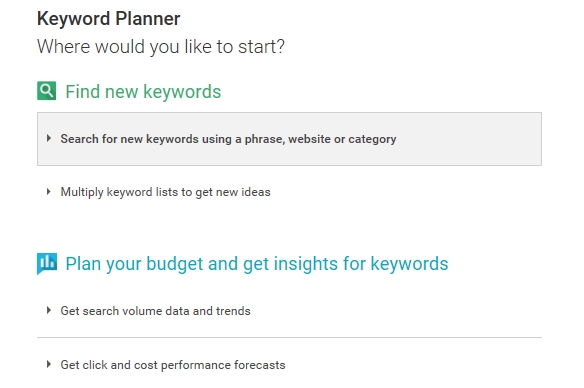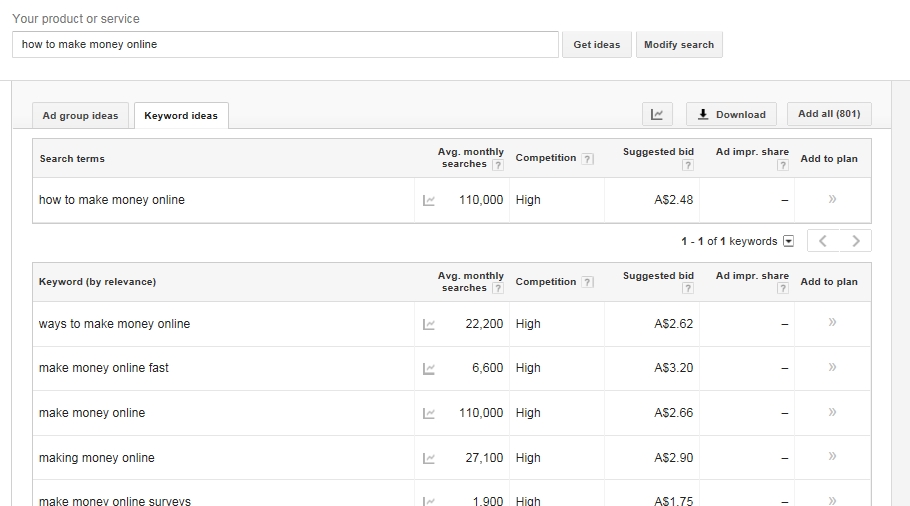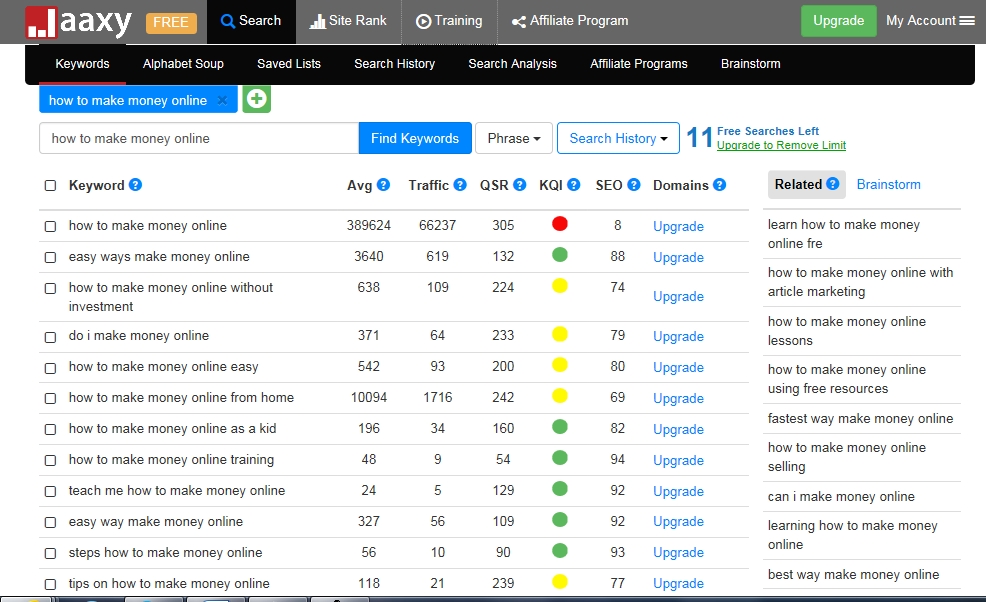As you get started in affiliate marketing, or any sort on online marketing for that matter, you’ll regularly hear about and read about keywords and using them to rank highly in search engines: notably Google. Good keyword choices are vital when it comes to search engine rankings. Not all traffic will come via search engines, but it is the best and most consistent way to receive passive and free traffic to your website, attracting qualified visitors that you don’t have to chase by spending advertising dollars.
Quality Content Is King

Search engines like Google are much more sophisticated beasts than they used to be. Once upon a time there were many ways to game the system and jump to the top of search engine rankings. That has all changed in recent times. Search engines are getting much smarter. The way the bots crawl the content of websites now is far more intuitive than it ever was before.
Google and the other major search engines have produced algorithms that scour sites for the richness of their content. Gone are the days when you could just throw up a site full of affiliate and AdSense ads, hide a few winning keywords in the meta tags and rank at the top of page one in search results. That won’t happen now. I site like that won’t even rank at all today.
Sites that are rich in helpful, insightful, quality content are what rank highly in search results; sites that are useful and informative to the visitor. That doesn’t mean you have to be a genius writer. If your writing totally sucks, there is always the option of outsourcing your content needs.
But good content is king in search results now.
The Importance of Keywords
Keywords are just as important as they’ve ever been in achieving high results in Google and Bing etc.. That hasn’t changed. What’s altered is the best way to implement these keywords.
You utilise them in the title of your post and again in your content. A good keyword or keyword phrase doesn’t necessarily have to feature in the title, but it’s good if you can use it there and again in the first or second paragraph of your content.
 Marketers used to employ a tactic called keyword stuffing, where a whole bunch of well-researched keywords were jammed into the article or post at every conceivable opportunity, making the content lumpy, awkward, unnatural and virtually unreadable for the viewer. If you try doing that today your site will just get banned from search engines like Google.
Marketers used to employ a tactic called keyword stuffing, where a whole bunch of well-researched keywords were jammed into the article or post at every conceivable opportunity, making the content lumpy, awkward, unnatural and virtually unreadable for the viewer. If you try doing that today your site will just get banned from search engines like Google.
Keywords are basically the search terms people key into a search engine when they are looking for information on a particular theme. If you found this article via a Google search, perhaps you keyed in something like:
- Keyword research
- Keyword research tools
- How to do keyword research
These are all keyword phrases. The most common search terms are what lead to valuable keywords to base your content around and attract visitors and traffic. As an affiliate marketer, the more traffic your site gets, the more you can earn from your affiliate offerings.
Low Competition Keywords
The trick is to find keywords that are used to instigate a lot of searches in the search engines, but don’t have that much competition from other people using them in their content. If there are thousands of people basing their content around the same keyword phrase, it’s going to be very difficult to reach the first page of search results in any search engine.
You have to think more like a customer and less like a marketer when doing your keyword research. We’ll get to some useful keyword research tools in a moment, but when searching for good keywords, type in something that you would naturally type into a search engine that is related to the topic you wish to write about and see what comes up.
Just about every keyword finder tool will have information on the amount of traffic that keyword (or phrase) gets per month, and whether there is high, medium or low competition for that keyword in the marketplace. What you are hoping to find are some keywords that get search engine traffic, but have low competition. The amount of traffic per month doesn’t have to be phenomenal. As long as there are some searches and the competition is low, you will rank quite highly and generate traffic to your site.
Low Hanging Fruit Keywords
These are also known as long tail keywords, and are often a little more unusual as far as regular search terms go. The low hanging fruit tends to be much more specific in nature. Here’s an example:
- TV – Short Tail
- Flatscreen TV – Mid Tail
- How Much Is A Flatscreen TV? – Long Tail
With long tail keyword searching being much more targeted and specific, it indicates the searcher is quite serious about what he or she is searching for. If they are keying in specific keyword phrases relating to a particular product, chances are they are on the verge of making a decision to purchase that very product. If you happen to be promoting that product on your site as an affiliate and they come across your content through their low hanging fruit keyword search, then guess what? They will likely click through on your affiliate link and you will make a sale.
You can target more popular search phrases, but you can have a lot of success by using the low hanging fruit keyword method.
Most of the content you write will be full of various keywords anyway, whether you chose them or not. Just about every word (or combination of words) you put on the page will be a keyword to somebody searching. The idea of your keyword research is to attract traffic from those people specifically looking for the kind of content you’ve written, your subject matter.
A method I regularly employ is to use a keyword phrase that is low competition as my main keyword, but I’ll also try to use a long tail keyword that’s relevant in my content as well. But only if it makes sense, and it has to be relevant to what you’re writing about.
Keyword Research Tools
To research keywords you need a good keyword tool, or keyword finder. There are a few out there, but many of them aren’t very good. I’ll list the two I personally use and recommend.
- Google Keyword Planner
- Jaxxy
Google Keyword Planner
This tool is offered by the Google company and is often used to research good keywords for paid AdWords campaigns. While it is free for anyone to use, you do need to first set up a Google AdWords account, which is also free to do. If you don’t already have an AdWords account, create one here. Otherwise, access Google Keyword Planner and sign in. On the left of the screen you will see the following options. Click on the one highlighted in the image below, enter your possible keywords, scroll down and click the blue ‘Get Ideas’ button.
You will now be taken to another screen where you will see a blue bar graph. Below the graph are 2 tabs. Select the tab that reads ‘Keyword Ideas’ and a list of related keywords will come up as per the image below.
As you can see, competition is high for the keyword phrase I typed into the keyword tool. Seeing that I would then need to dig deeper until I found keywords that fit my content, but had low competition with some search traffic.
It’s quite a simple tool to use, and with some playing around it doesn’t take all that long to find some usable keywords.
Jaxxy
 Jaxxy is a paid keyword tool, where a pro account costs $19/month. There is a free trial, where you can sign up for a free account and get 30 free searches just to try it out and take it for a test drive. The reason the Pro version costs money is because the tool digs that much deeper and is way more informative than something like the Google Keyword Planner. The program comes with training included, as well as many useful tools related to keyword searches.
Jaxxy is a paid keyword tool, where a pro account costs $19/month. There is a free trial, where you can sign up for a free account and get 30 free searches just to try it out and take it for a test drive. The reason the Pro version costs money is because the tool digs that much deeper and is way more informative than something like the Google Keyword Planner. The program comes with training included, as well as many useful tools related to keyword searches.
It’s an all-in-one keyword research and management toolbox. You can save your searches, refine your searches, do very deep keyword research. Jaxxy gathers information from all the major search engines and combines the results on the one platform, giving you the most accurate keyword research you could ever hope to find. It even comes with tools to search out profitable niches and domain names. There are 4 training videos accessible via the free trial account that walk you through the process of using Jaxxy to its full potential for all of the components it was designed for.
Take a look at the image below. This is the same search I performed in the Google Keyword Planner example above. See how much more information is offered in the results.
- The first column is a list of possible keyword alternatives. These are clickable to open up even more closely-matched results.
- In the second column we see the average number of searches per month for the keyword phrase.
- The third column is the amount of potential traffic you’ll receive to your site if you rank on the first page of Google.
- QSR represents the number of competing websites that have been ranked for that exact keyword.
- The KQI colour system is an indicator of whether a keyword is good or not, based on all the information. Green is good to go, yellow is ok, while red is basically a no go.
- SEO is a scale of 1-100, with the higher the number the better in this column.
- The Domains column (available only to upgraded users) lets you know the availability of domain names closely related to the keyword.
Jaxxy offers all sorts of features, so it’s best to sign up for a free trial account, watch the 4 training videos, then try it out with 30 free searches and see what you think.
It’s perfectly fine to use a free tool like the Google Keyword Planner, but when you gain more experience and really want to get serious about your keyword research, then Jaxxy is well worth signing up to for the Pro account. Watch the video below for a demonstration of just how powerful Jaxxy can be for your keyword research.
There is even an affiliate program attached to the Jaxxy account, and as an affiliate marketer you might be interested in signing up for that too. Try out the Jaxxy keyword search tool below:
To Wrap Up
So there you have it. As you can see, keywords play a very big role in getting your website and content ranked, which is what you want and need if you are to be successful in making an income online.
Darren Burton
Latest posts by Darren Burton (see all)
- NeuroGym: Harnessing Neuroscience for Personal Transformation and Success - October 31, 2023
- Is Lotto Profits a Scam or Not? Read This First! - August 27, 2019
- How to Boost Your Website’s Affiliate Sales - November 22, 2018









Excellent review on keywords. Very engaging and readable.
Regards,
Jeff
Thanks Jeffrey